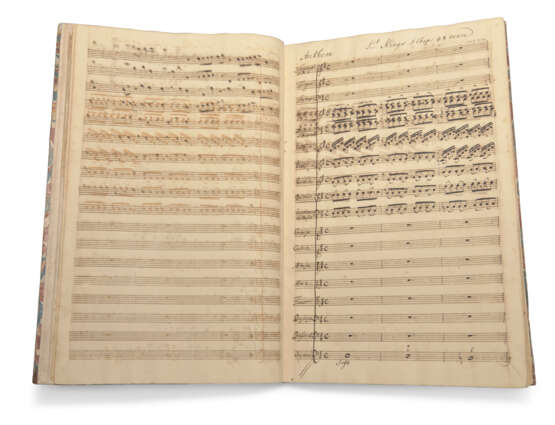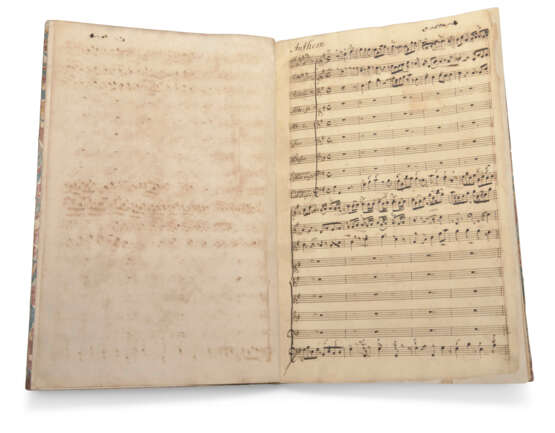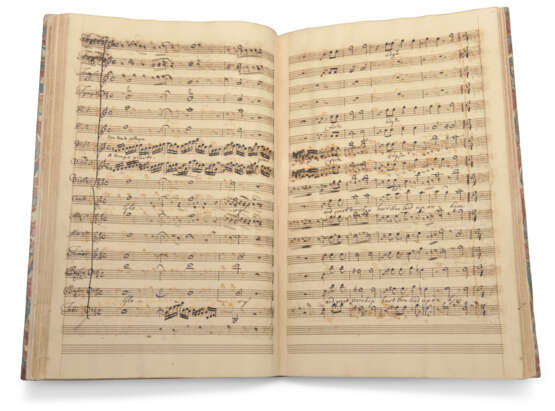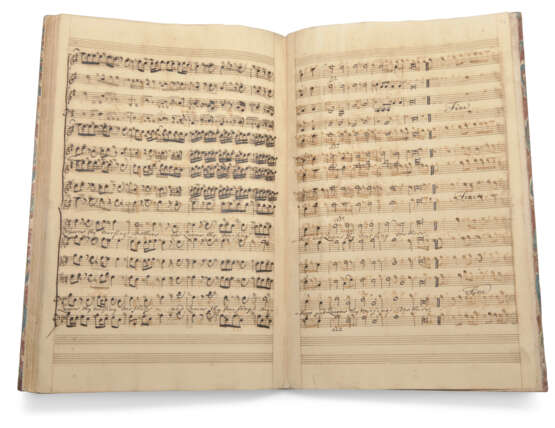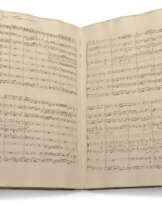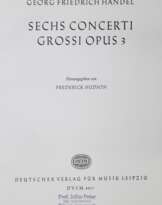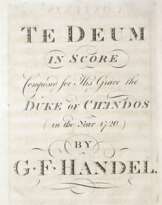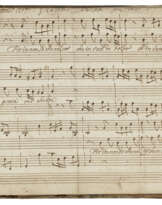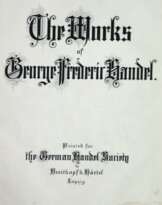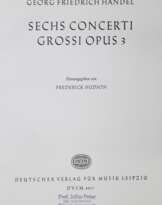ID 1053195
Lot 81 | George Frideric Handel (1685-1759)
Estimate value
£ 20 000 – 30 000
Contemporary scribal manuscript of the four Coronation Anthems, ‘Zadock the Priest’, ‘Let thy hand be strengthened’, ‘The king shall rejoice, ‘My heart is inditing’, HWV 258-261, n.p. [England], n.d. [18th century, after 1730]
An important contemporary manuscript source for Handel’s celebrated Coronation anthems, copied directly from the lost conducting score. First performed for the coronation of George II and Caroline in 1727, most famous among the Coronation anthems is the emblematic ‘Zadock the Priest’, which has been sung at every subsequent coronation of a British monarch.
Full score notated in dark brown ink on one or two systems of between nine and 12 staves per page. 148 written pages, 417 x 270mm, 18-stave hand-ruled Dutch paper, watermark: fleur-de-lys in a shield surmounted by crown over ‘LVG’ and countermarked ‘I V’ [18th-century; in use from the 1730s onwards], title (‘Anthem’) and scriptural sources of the anthems inscribed at openings, modern pencil foliation. Bound in 18th-century calf-backed marbled boards, lettered on spine ‘CORONATION MUSICK’.
Provenance:
(1) B. Schott’s Söhne publishing house, Mainz; short description in German in a 20th-century hand on headed notepaper pasted in the upper cover, attributing the manuscript to [John Christopher] Smith.
(2) Sotheby's, 6 December 2002, lot 85.
(3) Schøyen Collection, MS 5179.
Content: ‘Let thy hand be strengthened’ ff.1-10; ‘Zadock the Priest’ ff.11-25; ‘The king shall rejoice’ ff.26-52; ‘My heart is inditing’ ff.53-76.
Handel’s four Coronation anthems were composed for, and first performed at, the coronation of King George II and Queen Caroline, which took place at Westminster Abbey on 11 October 1727. The promise of the occasion at the Abbey and the opportunity to write for large forces spurred Handel to music of new and sublime opulence; the anthems epitomise the grand ceremonial style that was Handel’s original contribution to the course of English church music.
Manuscript sources for the Coronation anthems copied within a couple of decades of 1727 are the most valuable for casting light on the musical texts or Handel’s performances: our manuscript is listed as one of only eight in this category in Donald Burrows’ 2002 Novello edition of the Coronation anthems (‘source H’; pp.vii-viii). All but one of these sources derive not from Handel’s composing manuscript, held at the British Library (R.M.20.h.5), but from an important early manuscript, presumed lost. This missing manuscript – probably Handel’s performing score, made before the first performance in 1727 – must have included the significant emendation to ‘The King shall rejoice’ (a correction to the rhythm and text of bars 4-5, to read ‘and great worship’) evident in nearly all of the main secondary sources, both manuscript and printed, present on f.39 in our manuscript. The entry for the Coronation anthems in the Hallische Händel-Ausgabe (Series III, v. 10, 2015, pp.148-9, source 2.1/B) also lists the present manuscript foremost among the secondary sources, stating that it must have been copied from the lost conducting score, as it contains more errors than the other contemporary copies.
| Artist: | George Frideric Handel (1685 - 1759) |
|---|---|
| Place of origin: | United Kingdom |
| Auction house category: | Letters, documents and manuscripts |
| Artist: | George Frideric Handel (1685 - 1759) |
|---|---|
| Place of origin: | United Kingdom |
| Auction house category: | Letters, documents and manuscripts |
| Address of auction |
CHRISTIE'S 8 King Street, St. James's SW1Y 6QT London United Kingdom | ||||||
|---|---|---|---|---|---|---|---|
| Preview |
| ||||||
| Phone | +44 (0)20 7839 9060 | ||||||
| Buyer Premium | see on Website | ||||||
| Conditions of purchase | Conditions of purchase |
